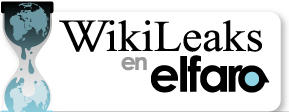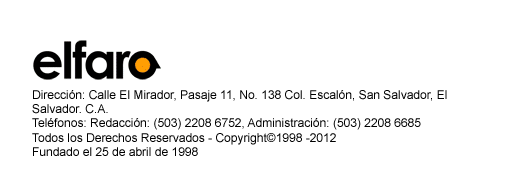EL SALVADOR: FIRST DRAFT OF 2006 INCSR PART II (MONEY LAUNDERING)
Publicado el 8 de Septiembre de 2011
id: 47808
date: 12/15/2005 19:15
refid: 05SANSALVADOR3490
origin: Embassy San Salvador
classification: UNCLASSIFIED
destination: 05SECSTATE210351
header:
This record is a partial extract of the original cable. The full text of the original cable is not available.
----------------- header ends ----------------
UNCLAS SECTION 01 OF 03 SAN SALVADOR 003490
SIPDIS
STATE FOR INL, WHA/CEN, EB/ESC/TFS
JUSTICE FOR OIA AND AFMLS
TREASURY FOR FINCEN
E.O. 12958: N/A
TAGS: SNAR, EFIN, KCRM, KTFN, PTER, KJUS, ES
SUBJECT: EL SALVADOR: FIRST DRAFT OF 2006 INCSR PART II
(MONEY LAUNDERING)
REF: SECSTATE 210351
1. (U) Per Reftel, the following is Post's first draft of
the 2006 INCSR Part II. Year-end statistics for CY-05 are
not yet available. Post will add these statistics in January
2006 and retransmit this report. Text follows.
2. (U) El Salvador
Located on the Pacific coast of the Central American isthmus,
El Salvador has one of the largest and most developed banking
systems in Central America. Its most significant financial
contacts are with neighboring Central American countries, as
well as with the United States, Mexico, and the Dominican
Republic. The January 2001 adoption of the U.S. dollar as
legal tender, along with the size and growth rate of the
financial sector, makes the country a potentially fertile
ground for money laundering. In 2005, approximately US$XXX
billion in remittances was likely sent to El Salvador through
the financial system. Most were sent from Salvadorans
working in the United States to family members. Additional
remittances flow back to El Salvador via other methods such
as visiting relatives and regular mail.
Most money laundering in El Salvador is conducted by
international criminal organizations attempting to mask
revenues from illicit activities. These organizations use
bank and wire fund transfers from the United States to
disguise criminal revenues as legitimate remittances to real
persons in El Salvador. The false remittances are collected
and transferred to other financial institutions until
sufficiently laundered for use by the source of the criminal
enterprise -- usually a narcotics trafficking organization.
Decree 498 of 1998, the &Law Against the Laundering of Money
and Assets,8 criminalizes money laundering related to
narcotics trafficking and other serious crimes, including
trafficking in persons, kidnapping, extortion, illicit
enrichment, embezzlement, and contraband. The law also
establishes the Financial Investigations Unit (FIU) within
the Attorney General's office. The FIU has been operational
since January 2000. The National Police (PNC) and the Central
Bank also have their own anti-money laundering units.
Under Decree 498, financial institutions must identify their
customers, maintain records for a minimum of five years,
train personnel in identification of money and asset
laundering, establish internal auditing procedures, and
report all suspicious transactions and transactions that
exceed approximately $57,000 to the FIU. Entities obligated
to comply with these requirements include banks, finance
companies, exchange houses, stock exchanges and exchange
brokers, commodity exchanges, insurance companies, credit
card companies, casinos, dealers in precious metals and
stones, real estate agents, travel agencies, the postal
service, construction companies, and the hotel industry. The
law includes a safe harbor provision to protect all persons
who report transactions and cooperate with law enforcement
authorities, and also contains banker negligence provisions
that make individual bankers responsible for money laundering
at their institutions. Bank secrecy laws do not apply to
money laundering investigations.
To address the problem of the international transportation of
criminal proceeds, Decree 498 requires all incoming travelers
to declare the value of goods, cash, or monetary instruments
they are carrying in excess of approximately $11,400.
Falsehood, omission, or inaccuracy on such a declaration is
grounds for retention of the goods, cash, or monetary
instruments, and the initiation of criminal proceedings. If,
following the end of a 30-day period, the traveler has not
proved the legal origin of the undeclared property, the
Salvadoran authorities have the right to confiscate it.
The Government of El Salvador (GOES) has established systems
for identifying, tracing, freezing, seizing, and forfeiting
narcotics-related and other assets of serious crimes. The FIU
and the PNC have adequate police powers to trace and seize
assets, but both organizations lack the resources to do so.
Even if resources were abundant, it remains to be seen if
these government agencies can cooperate to achieve their
anti-money laundering goals.
For example, only one arrest for money laundering was
achieved in 2005. The detained individual is accused of
establishing wire transfer accounts in fictitious names in
order to receive transfers from the United States disguised
as remittances. Unfortunately, the Attorney General's office
declined to pursue several leads generated by this person's
arrest. As a result, it is likely that any evidence linking
others to this scheme has already been destroyed.
Forfeited money laundering proceeds are deposited in a
special fund used to support law enforcement, drug treatment
and prevention, and other related government programs, while
funds forfeited as the result of other criminal activity are
deposited into general government revenues. Law enforcement
agencies are allowed to use certain seized assets while a
final sentence is pending. In 2005, the dollar amount of
assets seized and forfeited totaled $XXX million, mostly
derived from narcotics trafficking. There exists no legal
mechanism to share seized assets with other countries.
Salvadoran law currently provides only for the judicial
forfeiture of assets upon conviction (criminal forfeiture),
and not for civil or administrative forfeiture. A draft law
to reform Decree 498 to provide for civil forfeiture has
stalled in the National Legislature.
Although Decree 498 does not specifically mention terrorism
or terrorist financing as predicate offenses for money
laundering, it criminalizes the laundering of the proceeds of
serious criminal acts. This has been interpreted to include
terrorism. Therefore, it is illegal to launder money
generated by a terrorist act, and assets of terrorists that
are derived from criminal activities could be targeted under
Decree 498. However, providing legitimate money (money that
is not derived from a criminal act) to known terrorist
organizations is not considered to be a crime, and the person
contributing those funds could not be prosecuted unless it
could be shown that he or she was directly involved in the
planning or execution of a crime. The GOES has drafted
anti-terrorism legislation that will further define acts of
terrorism and establish tougher penalties for the execution
of those acts. The draft legislation, if passed, would also
grant the GOES the legal authority to freeze and seize
suspected assets associated with terrorists and terrorism.
The GOES has provided financial institutions with the names
of all individuals and entities listed by the UNSCR 1267
Sanctions Committee. These institutions are required to
search for any assets related to the individuals and entities
on the lists. There is no evidence that any charitable or
nonprofit entity in El Salvador has been used as a conduit
for terrorist financing.
El Salvador has signed several agreements of cooperation and
understanding with supervisors from other countries to
facilitate the exchange of supervisory information, including
permitting on-site examinations of banks and trust companies
operating in El Salvador. El Salvador is a party to the
Treaty of Mutual Legal Assistance in Criminal Matters signed
by the Republics of Costa Rica, El Salvador, Honduras,
Guatemala, Nicaragua, and Panama. Salvadoran law does not
require the FIU to sign agreements in order to share or
provide information to other countries. The GOES is party to
the Inter-American Convention on Mutual Assistance on
Criminal Matters, which provides for parties to cooperate in
tracking and seizing assets. The FIU is also legally
authorized to access the databases of public or private
entities. The GOES has cooperated with foreign governments in
financial investigations related to narcotics, money
laundering, terrorism, terrorism financing, and other serious
crimes.
El Salvador is a member of the OAS Inter-American Drug Abuse
Control Commission Experts Group to Control Money Laundering
(OAS/CICAD), the Caribbean Financial Action Task Force and
the Egmont Group. The GOES is party to the OAS Inter-American
Convention Against Terrorism and the UN International
Convention for the Suppression of the Financing of Terrorism,
as well as the 1988 UN Drug Convention. El Salvador ratified
the UN Convention against Transnational Organized Crime and
the UN Convention Against Corruption in March and July of
2004, respectively. El Salvador is also a signatory to the
Central American Convention for the Prevention and Repression
of Money Laundering Crimes Related to Illicit Drug
Trafficking and Related Crimes.
The growth of El Salvador,s financial sector, the increase
in narcotics trafficking, the large volume of remittances,
and the use of the U.S. dollar as legal tender make El
Salvador vulnerable to money laundering. El Salvador should
continue to expand and enhance its anti-money laundering
policies and strengthen its ability to seize and utilize
assets. The Government of El Salvador should criminalize the
support and financing of terrorists and terrorist
organizations.
Barclay
=======================CABLE ENDS============================




